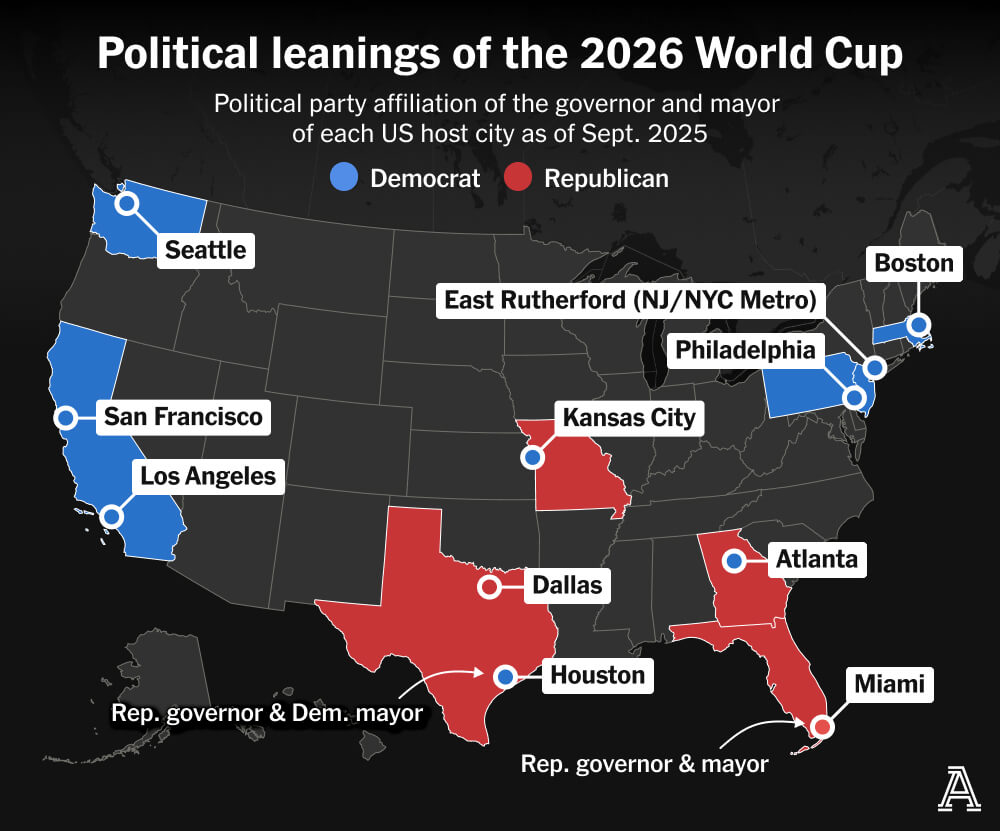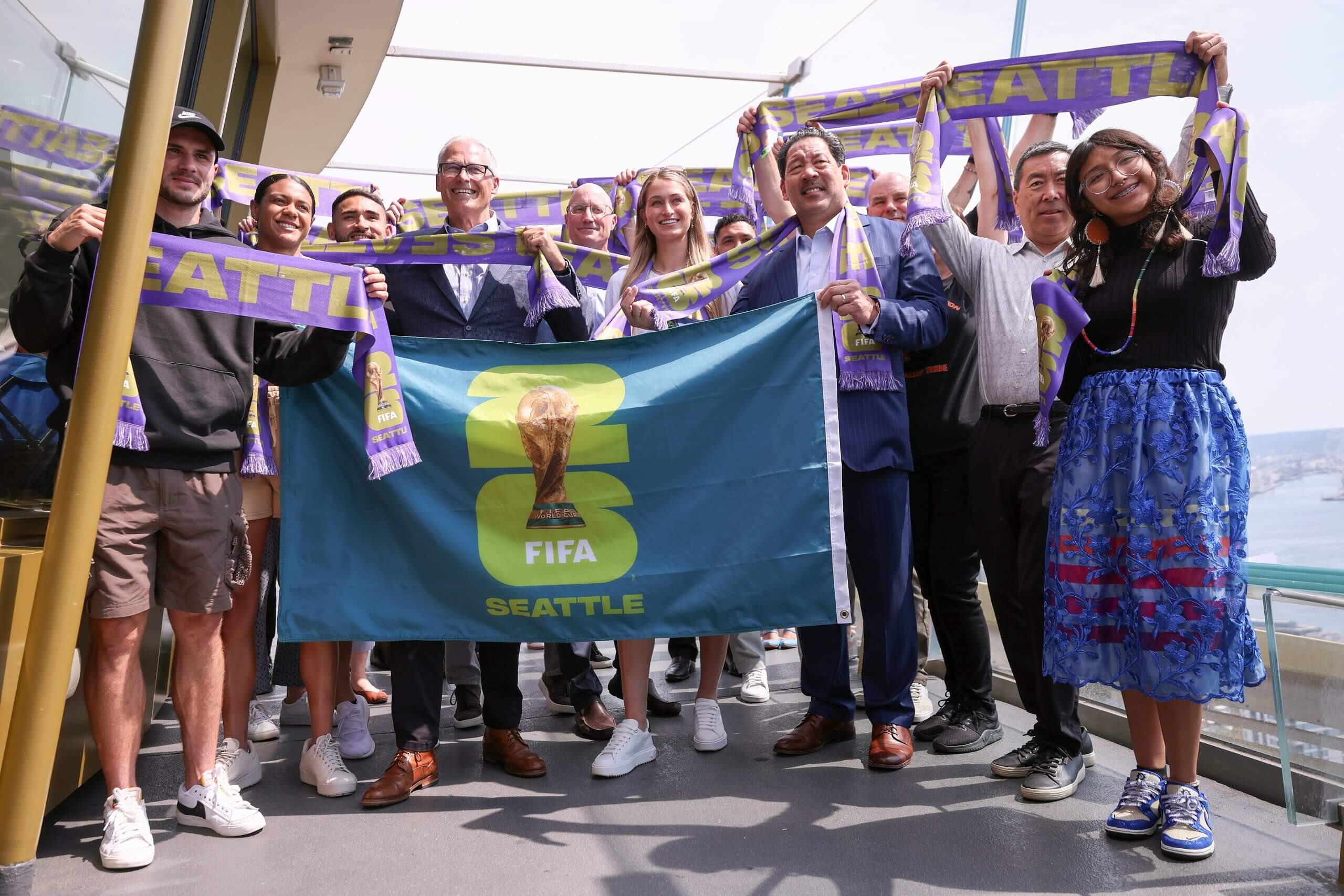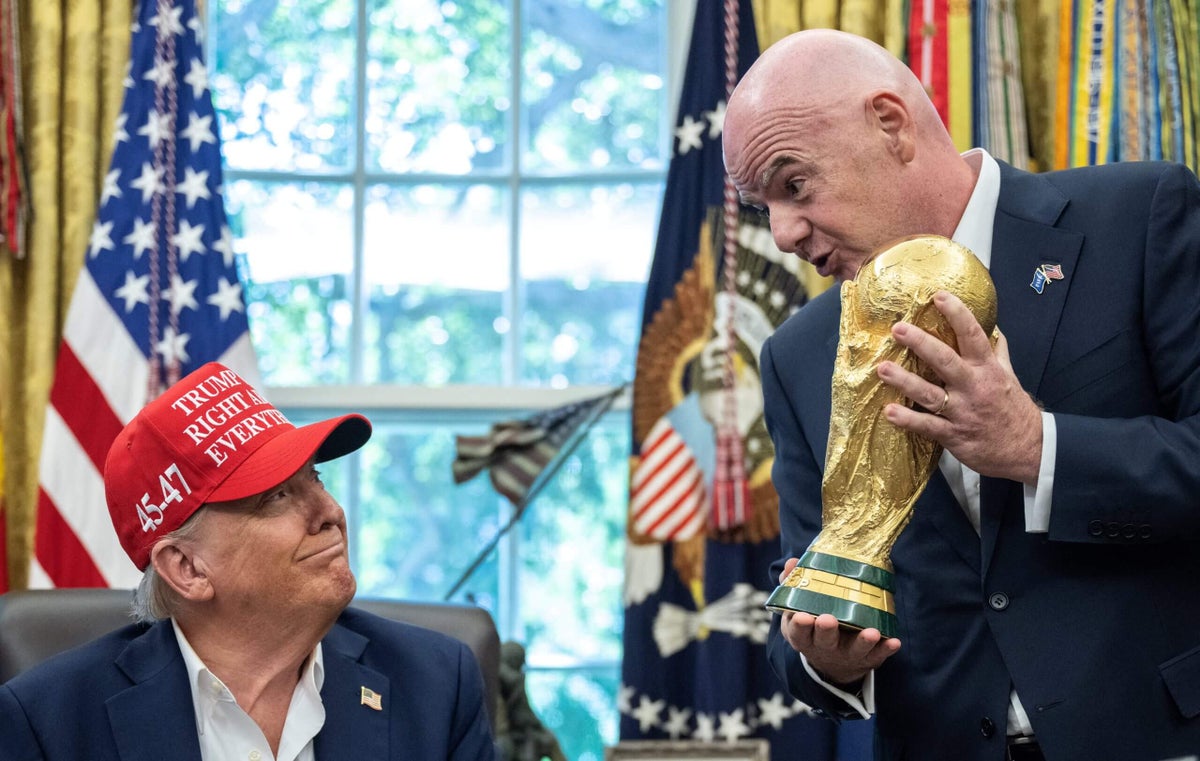President Donald Trump’s suggestion that he could move 2026 World Cup games out of U.S. cities he deems unsafe rippled through soccer and political circles in late September. Then he doubled down in mid-October, repeating his assertions.
The idea, previously unexplored, was first raised by a reporter at the White House and entertained by Trump. It sparked a wide range of reactions, many tinged with confusion, because the U.S. government had no official role in choosing World Cup host cities; and it does not have any explicit authority to relocate World Cup games.
Nonetheless, Trump’s comments elicited responses from host city mayors and World Cup organizers. Seattle Mayor Bruce Harrell ripped Trump’s “ignorance,” and said in a statement: “We’re working every day to make the World Cup a safe, welcoming, and fun experience.”
The following is a rundown of what else has been said and whether games could actually be moved.
What did Trump say?
Trump did not proactively make the suggestion. In fact, he initially seemed to resist it. During a press session in the Oval Office, when the reporter prefaced his question with “immigration, crime and the World Cup,” Trump interjected with a hint of humor: “That’s a lot — that’s a lot of questions.”
The reporter continued: “You have a number of cities that are pushing back against your immigration and deportation, as well as your crime initiatives.”
Trump interjected again: “I don’t think they’re very much pushing back at all.”
The reporter went on: “But some of those cities have World Cup games. Seattle, San Francisco.”
Trump cut him off yet again: “They’re gonna be very secure.”
But the reporter continued: “Could those games move if they don’t cooperate with your crime initiatives and your immigration initiatives?”
Trump then spoke for two minutes and 45 seconds. He began: “Well, that’s an interesting suggestion. I guess. But we’re gonna make sure they’re safe.”
He continued on a tangent about cities who, he said, are “run by radical left lunatics that don’t know what they’re doing.” He spoke about Washington, D.C., which is not hosting World Cup games. He spoke about Memphis and Chicago. “It will be safe for the World Cup,” he said, despite both Memphis and Chicago also being uninvolved. (Chicago pulled out of the running for World Cup games during the bid phase, citing “FIFA’s inflexibility” and taxpayer risk.)
“If I think it isn’t safe, we’ll move it into a different city, absolutely,” Trump said. “It’s actually a very fair question. If I think it’s not safe, we’re going to move it out of that city.”
He then went on another tangent about JB Pritzker, the governor of Illinois, who has accused Trump of deploying National Guard troops to Democrat-controlled cities in an effort to exert “authoritarian” control ahead of next year’s midterm elections.
Trump concluded: “If any city we think is gonna be even a little bit dangerous for the World Cup … we won’t allow it to go to [those cities], we’ll move it around a little bit. But I hope that’s not going to happen.”
When repeating his remarks in another Oval Office media session, Trump said he would call in a personal favor with FIFA president Gianni Infantino.
“If I feel there’s unsafe conditions, I would call Gianni — the head of FIFA, who’s phenomenal — and I would say, ‘let’s move it to another location,’ and he would do that.” Trump said. “He wouldn’t love to do it, but he’d do it very easily.”
Can Trump do that?
The World Cup is owned and operated by FIFA, soccer’s global governing body. FIFA, years ago, signed “host city agreements” and “stadium agreements” with entities in various U.S. markets, and chose 11 of them — plus three in Mexico and two in Canada — to host games.
The federal government, meanwhile, signed various declarations and guarantees when the three North American countries were bidding to host the World Cup back in 2018, during the first Trump administration. But it had no role in selecting the cities or negotiating their contracts, which were originally signed in 2017 and updated with addendums in 2022.
“The federal government is not a direct party to these agreements,” Nathan O’Malley, an attorney at Musick, Peeler & Garrett and co-leader of the firm’s Olympics & World Cup practice group, told The Athletic.
Trump, therefore, cannot unilaterally cancel those contracts and move games to other cities.
The contracts, some of which have been obtained via public records requests, do require cities to implement robust security and public safety measures. If FIFA deems a city unsafe, it could, potentially, terminate the agreements and relocate matches. Trump, in theory, could pressure FIFA to do so.
But leaders in most or all 11 cities have stated their confidence in the security plans being developed.
“Public safety officials, including our Republican-appointed Police Board, are working daily to ensure the games in Kansas City are safe for all,” Kansas City Mayor Quinton Lucas told The Athletic in a statement via a spokeswoman. “I am confident in their work. FIFA loves Kansas City and Kansas City loves FIFA. We’ll be fine.”
What else could Trump do?
Trump has a direct line to FIFA’s president, his “great friend” Infantino, who has publicly supported and praised Trump repeatedly. In December will bring the World Cup Draw to Washington, D.C., largely so that Trump can be involved.
Trump, in theory, could leverage this relationship and push Infantino to pull games out of cities whose mayors resist him, which is what he insinuated in his Oct. 14 remarks. It’s unclear how Infantino and FIFA would respond. After the initial suggestion, FIFA did not give a statement, but in responding to a query from Politico following Trump’s doubling-down, a FIFA spokesperson said, “Safety and security are of the utmost importance at all FIFA events worldwide and it is ultimately the government’s responsibility to decide what’s in the best interest of public safety. We hope every one of our 16 host cities will be ready to fulfill all necessary requirements for a successful 2026 World Cup.”
Trump’s other potential lever is the $625 million in security funds that Congress allocated to World Cup cities this summer. That money will be split proportionally — not equally — among the 11 U.S. host cities, depending on their needs. The cities will submit their costs and requests for reimbursement, according to Andrew Giuliani, head of the White House’s World Cup task force. It’s unclear if Trump, who chairs the task force, could potentially politicize and withhold some of that funding.

(Graphic: Drew Jordan / The Athletic)
Which cities would Trump target?
Trump has clashed with Democratic mayors throughout his second term over immigration policy and other topics. His latest push is on crime. After his federal takeover of D.C., he has threatened to send troops to Chicago and other cities, even as many mayors and governors say that crime is not out of control and federal assistance is not necessary or welcome.
The World Cup host cities in left-leaning states with Democratic mayors that Trump could target would include Seattle, San Francisco and the Bay Area, Los Angeles and Boston. Philadelphia, Atlanta, Dallas and Kansas City are also led by Democrats. The U.S. men’s national team is due to play its group games in L.A. and Seattle.
Is moving games realistic?
At this stage, eight-and-a-half months out from the World Cup opener, finding new host cities would be unrealistic. The 11 chosen cities have already spent years preparing for matches and adjacent events, plus the thousands of visitors they’ll bring. It would be extremely difficult for a 12th city to cram all that planning into eight months. And especially after the Dec. 5 draw, relocation would anger fans and teams who’ve planned travel to a specific city.
Perhaps some of the 11 cities could take on additional games, if one or two cities were forced out of the rotation. But even that would be a massive disruption. FIFA set the World Cup schedule, complete with dates and locations, in 2024. It has already sold hospitality packages to specific stadiums, and is set to open ticket sales next week.
According to one person briefed on the planning efforts, who spoke on the condition of anonymity because they were not authorized to disclose details, FIFA has previously told local organizers that it will not be relocating games.
Which cities are currently slated to host the 2026 World Cup?
The 11 U.S. cities and stadiums slated to host the 2026 World Cup are:
Boston — Gillette Stadium in Foxborough, Mass.
New York — MetLife Stadium in East Rutherford, N.J.
Philadelphia — Lincoln Financial Field
Atlanta — Mercedes-Benz Stadium
Miami — Hard Rock Stadium in Miami Gardens, Fla.
Kansas City — Arrowhead Stadium in Kansas City, Mo.
Dallas — AT&T Stadium in Arlington, Texas
Houston — NRG Stadium
Los Angeles — SoFi Stadium in Inglewood, Calif.
San Francisco/Bay Area — Levi’s Stadium in Santa Clara, Calif.
Seattle — Lumen Field
In Mexico, Monterrey, Guadalajara and Mexico City are the three hosts. The two in Canada are Toronto and Vancouver.

Seattle will host 2026 World Cup games at Lumen Field (Photo by Steph Chambers/Getty Images)
Seattle’s response to Trump
Most mayoral offices and local World Cup host committees have declined to comment or did not respond to The Athletic’s inquiries. Representatives in a few cities, however, have spoken.
Harrell’s words were the strongest. Seattle’s mayor said in a statement published on his website: “President Trump continues to display his ignorance about our city. We are doing the hard work to prepare for this once-in-a-generation opportunity to welcome the world to Seattle.
“The facts are clear: violent crime is down 20% in Seattle. We are making record-breaking progress on police hiring with nearly 130 officers hired this year. My proposed 2026 budget also makes additional investments in safety preparations for the World Cup, including new removable vehicle barriers at Pike Place Market and Seattle Center campus.
“While we are doing our part to make safety improvements ahead of hosting games, the Trump administration has made our city less safe by withholding critical funding for counterterrorism tools. While the City’s lawsuit has successfully released a portion of this funding, President Trump’s words about safety don’t align with his administration’s actions.
“We’re working every day to make the World Cup a safe, welcoming, and fun experience for both residents and visitors to our city and will continue to advance plans with local partners to ensure we make the most of this special event.”
A spokesperson for Harrell had previously told KOMO News: “While the president continues to peddle baseless, divisive, and empty threats, our administration is doing the hard work to prepare for this opportunity. We’re working every day to make the 2026 World Cup a safe, welcoming, and fun experience for residents and visitors. We’re advancing plans with FIFA and local partners to ensure Seattle is a destination and that we make the most of this special event.”
Hana Tadesse, a spokeswoman for the Seattle World Cup host committee, wrote in a statement to The Athletic: “We are committed to ensuring a safe, welcoming, and memorable experience for fans, players, visitors, and residents alike. Since being selected by FIFA as a host city, we’ve worked closely with them, the White House Task Force for FIFA World Cup 26, community partners, and law enforcement, and are confident in our planning and coordination in advance of next summer’s matches. Seattle looks forward to shining on the world stage and hosting an event that is not only spectacular, but safe for all.”
How have other cities responded?
Boston Mayor Michelle Wu, who has previously said that “Boston will not back down” from the Trump administration amid legal threats over immigration policies, initially said in response to a question about Trump’s World Cup comments: “We are very excited for the summer that Boston will have next year. It’s going to be an incredible show of what our city’s made of as we welcome people from all over the world [for the World Cup and other events]. We are very proud, and hold ourselves to the high standards of being the safest major city in the country. And that takes work every day, but we have the record and the results to prove it.”
With Boston specifically targeted in Trump’s latest threat, Wu simply said, “Boston is honored and excited to host World Cup matches, and we look forward to welcoming fans from around the world to our beautiful city, the cradle of liberty and city of champions.”
Natalie Hamilton, a spokeswoman for the New York/New Jersey host committee, wrote in a statement to The Athletic: “Formal agreements are in place between each Host City and FIFA, and we continue to work closely with FIFA and our local, state, and federal partners to ensure a safe and secure tournament, which remains our top priority. Planning for World Cup is already underway, and we are fully committed to delivering an unforgettable tournament that this country, and this region, will be proud of well beyond 2026.”
Philadelphia Soccer 2026 said in a statement to The Athletic: “We appreciate President Trump’s commitment to safety and security for this global event, and we share that same commitment, as do our colleagues across the nation. Safety is paramount to the City of Philadelphia, and we have every confidence in the significant planning that is ongoing between City, State, and Federal officials as well as the White House Task Force. Just as Philadelphia was for the political conventions, Papal Visit and NFL Draft, we will be ready to welcome the world and deliver a safe, exceptional experience for fans and residents alike.”
Adam Crafton, Melanie Anzidei and Felipe Cardenas contributed reporting to this story.
